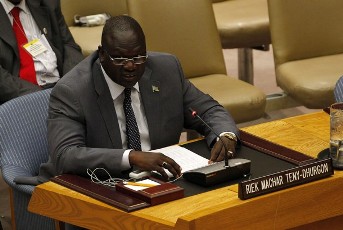Bor students in Uganda welcome apology of South Sudan’s VP Machar
By Philip Thon Aleu
August 30, 2011 (KAMPALA) – Bor students in Kampala, Uganda have described the apology of South Sudan’s Vice President, for the killings of civilians – which took place while he led a rival rebel movement during the civil war – as “beginning of a new era”.

The attempted coup by Machar and others, known as the ‘Nassir Declaration’, failed to garner enough support to topple the SPLM/A’s powerful chairman John Garang and soon the two factions began to fight each other, resulting in the killing of hundreds of civilians in Bor and the displacement of thousands.
Ajak Alak, the chairman of Bor youth and students association (BOYSA) in Kampala, welcomed Machar’s apology with some reservations.
“Dr. Riek’s apology is a beginning of a new era of peacebuilding in our country,” said Alak adding that “the next issue is how we are going to address the effect of war and the destruction caused in Bor in 1991.”
The student leader noted that without reconciliation of people at the ”grassroots”, any apology made in Juba might be “temporary because it will not achieve the much needed long-lasting peace” in newly independent South Sudan.
A referendum in January secured South Sudan’s separation from the north as part of a 2005 peace deal. Machar rejoined the SPLM/A in 2002 and was made Vice President of South Sudan in 2005, which for six years was ruled by the SPLM as an autonomous region of Sudan as part of the peace agreement.
“We need peace, reconciliation and development in the new nation [of South Sudan] now that the war has ended”, Alak said.
“There are orphans, widows and disabled people in Bor who cannot support themselves because their people were killed,” he said.
Involving traditional chiefs and political leaders from Bor, as well as the Lou Nuer who played a part in the 1991 attack, to have some sort of reconciliation process would be a good example for others in the fledgling country, he added.
The ‘Bor Massacre’ is an extremely sensitive topic among Dinka Bor but Alak said that enough time had passed and people’s “senses are now normal [enough] after [the] long war” to enable it to take place.
Ayom Mawut, who taken captive by Machar’s forces from August 1991 to September 1992, also welcomed the apology but said that reconciliation had already occurred.
“By-gone is by-gone and we can stick [it] to the past,” Mawut said.
“Reconciliation has already made itself and that is why Dr. Riek is a Vice President in [the] SPLM government. We are reconciled and we are living together,” he added.
Mawut, who was trained as an SPLA soldier in Ethiopia in 1989, fell to Machar’s forces having not known the split of the movement. He said their army generals, decorated by John Garang, were detained and “lynched” in Nassir prisons.
“Dr. Riek was not supporting killing but his people were not serious. They [Machar’s close supporters] thought Dr. Riek did not want people [from other tribes]. A lot of people were killed and Dr. Riek condemned this without doing anything to bring the culprits to book,” he added.
“But we have to accept the reconciliation and move ahead with efforts to help those directly affected by the killing in Bor,” he said.
APOLOGY MADE IN THE WRONG PLACES
Some students members of the Bor youth and students association (BOYSA) in Kampala did not think their chairman should have accepted the apology as it was made in Juba and not in Bor.
Machar first made the apology to senior members of the Bor community at the house of Rebecca Garang, the wife of the SPLM/A’s former leader at her house on August 9 in the presence of Dinka Bor leaders. After much speculation he confirmed that he made the apology at a Church service on Sunday.
Nyok Malet said that to show seriousness to the matter the Vice President should travel to Bor to make his apology.
“People who suffered during the 1991 massacre are in Bor and any apology should be brought to them,” he said.
Garang and Machar reconciled in 2002 after a nine year split in the movement. The main contention between the two was that Machar insisted that the aim of the civil war should be self determination for South Sudan, while Garang’s ‘New Sudan’ vision envisaged a united, secular, federal, pluralistic and democratic Sudan.
In the negotiations which led to the 2005 peace it became apparent that Sudan’s rulers would not remove Shari’a law from the North, even if they would allow South Sudan to be secular.
The agreement said that if unity had not been made attractive to South Sudan then it would be able to vote for separation in a referendum. After a bitter six years of power sharing, nearly 99% of votes cast were for independence.
Garang died weeks after becoming Sudan’s Vice President and President of South Sudan in August 2005. His successor Salva Kiir made Machar his deputy in an act of reconciliation with South Sudan’s second largest ethnic group, the Nuer.
Tribal feuds remain a major threat to the new nation. In Jonglei state, tribal conflicts over cattle and child abduction continue to take lives of civilians. Poor infrastructure also makes the movement of troops difficult.
Bor students in Kampala said that Machar’s apology should be backed up with the building of schools, health centers and roads throughout Jonglei State. They argued that building better roads would allow tribes to trade and have more contact with each other, adding that this could improve relations.
(ST)
